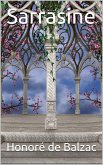A short story about one of those patient saintly idealised women who probably exist only in Balzac's imagination, and her two children. When she dies almost penniless, the elder makes provsion for his younger brother's education and sets off apprenticed to the sea.
The best bit about this story is actually Balzac's glorious description of La Grenadiere, the house where the story takes place. If you have been to the Loire Valley in France, Balzac's words will enchant you all over again.
The best bit about this story is actually Balzac's glorious description of La Grenadiere, the house where the story takes place. If you have been to the Loire Valley in France, Balzac's words will enchant you all over again.









